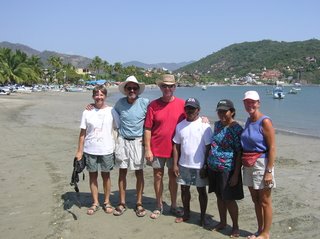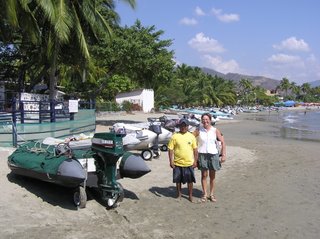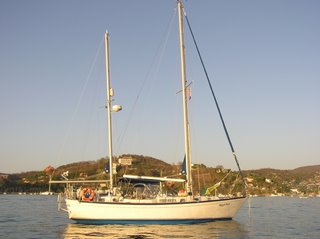I was going to write this first thing this morning as the sun came up but I was too queasy from the motion of the boat, especially after our rough passage yesterday. We left yesterday morning from Zihua expecting calm seas and light winds. However, Mother Nature had other plans and we had to fight strong winds (on our nose and on our course of course) and rough swells from the same direction. We ran the engine for the first three hours and then got shamed by our buddies on S/V White Swan to shut off the motor and sail. The best course we could lay sailing was 208 degrees true and what we wanted was 270 degrees true, or due west. The forecast was for light winds close in turning to stronger winds out of the north but it never happened. So we had a wet boat and seasickness until about 3am the next morning. We both took some anti-quease pills and they help but the side effects are way bad - irritability, cloudy thinking, sleepiness. I have to admit (bad boy) that I actually catnapped through part of my late night watch, and we made it, but will not do that again. No more pills.
To point out why that is important, right after dawn this morning, I had to change course slightly to give this big tanker room to cross our bow, otherwise it would have been close. The officers on the bridge came out to look at the crazies in the little sailboat going away from land. When this gets posted to our blog, a position report will also go out to both Yotreps and Winlink for vessel tracking. The link on the right side at the top of the blog will take you to Yotreps and you can find position reports for Winlink at www.winlink.org but I can't give you the details right now - you'll have to figure it out. Our vessel radio code name is WCZ6559 on Yotreps, and it will be either the same or KE7BQN on Winlink.
We are now the longest distance from land we have ever been, although Maggie Drum has done this for years with the previous owners. Maggie Drum spent eight years in the South Pacific before and so is just coming home again. We on the other hand have a LOT to learn. This morning on our "Westbounders" radio net we found out that one of our buddy boats that had left the day before us decided to head back and spend the rest of the season in Mexico. They said they just weren't ready and we completely understand. You have to be mentally and physically ready to do this since you are committed in a big way when you go this far. All our boats got wet from the big swells on the bows and their computer took a saltwater shower from a leaking port above the nav station and that was the wake-up call for them. We will miss their easy smiles and companionship.
We will likely have to motor up to 200-300 nm from shore before the north-east trade winds kick in and we can sail a good course. Our plan is to go west as long as we can until we get the trades, then angle down to 4 degrees north 130 degrees west then head south across the equator (yaa-hoo) then west to the Marquesas. I apologize if I am repeating a previous blog, but can't claim any mental competency or else why would I be out here?
We are very psyched (sick or happy one of the other) to be doing this. We didn't want to wait longer since you never know what accidents or illness can befall you on land. It feels like a for real adventure but is almost easy with today's modern conveniences like chartplotters, GPS, radar, radios, email, EPIRBs, etc. BTW - for you safety conscious types out there - an EPIRB is an Electronic Position I? Reporting Beacon. If you were to accidentally sink the boat or have to abandon it on the high seas, you can set this thing off, or it will set off automatically in sea water, and it will broadcast a satellite message to these specialized location satellites (not GPS). The US and other countries got together and put this in place for all mariners including commercial. It will allow rescuers to home in on your position quickly and send help if possible or direct any mariners in the vicinity to the EPIRB's location. I think it will broadcast for at least 3 days. Ours is brand new and state of the art. The NOAA.gov website has more info or you can Google it. We also have a high seas type emergency life raft with supplies packed in and lots and lots of other emergency gear - radios, water, food, life jackets, etc., etc. And, Whitby 42's are one of the strongest of the world's cruising sailboats with hundreds of thousands of off shore miles on them. The above is for the nervous nellies out there, who we understand and love. We have every intention of getting there in one piece and if not with the boat with ourselves.
I can't say the same thing for the boobies who park on our boat spreaders or bow rail and empty the partially digested fish dinners they have been having on our decks and gear. In Zihua, we bought 15 gallons of extra fresh water to at least get some of the dirt and grime off our decks before we left, and 30 minutes later a very large and proud Booby sat on our mainmast spreader and pooped all over our nice and clean solar panels. Yuck!! This stuff not only smells, it is one of the hardest substances known to friend or fowl to get off once it has dried. This is for real guano and we have to walk on it and try to get it off. So I got out my trusty, but rusty, slingshot and my bag of marbles and chased him off. I love birds and watching these expert fishers get their fish, but my love turns to unmitigated hatred when they park on the boat. One did so out here and Cindy chased him off but they are very unafraid of people and sometimes they will not leave. So, I don't want to hurt one, but they had better not try me!
We will write as often as we can, which may be daily, or weekly or every other week. If you do not hear from us for longer than you think, don't worry, we probably are having a problem with the radio or something else, like radio reception or get too busy or whatever. We have lots of support out here so don't be calling the Coast Guard if we miss an email or blog report right away. And, we love you all. Now it's time for the next radio net. Bye




